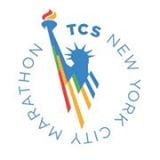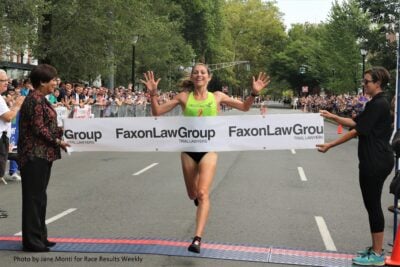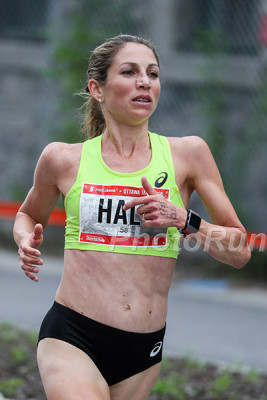For Sara Hall, A Dream Deferred Led to a Passion Realized
Ten years ago, Sara Hall wanted to leave the sport but stayed because she felt she had no choice; now she’s thriving as America’s fastest women’s marathoner of 2019
By Jonathan Gault
October 31, 2019
It seems a distant memory now, but there was a time when Sara Hall did not love the sport of running. This was a decade ago, before Hall was hoarding national titles on the roads, before she was cheering her daughters on at cross country races, before she was the sixth-fastest American woman to ever run the marathon distance.
It was a decade ago, and Hall was living in Mammoth Lakes, Calif., with her husband, Ryan, who had blossomed into one of America’s greatest men’s marathon talents, running 2:06 at age 25. There was no limit on Ryan’s potential. He was, as they say, living the dream.
Sara, decidedly, was not. From the time she began running, Sara had always experienced success. As a high school senior in 2000, she won the national title at the Foot Locker Cross Country Championships. And though she never won an individual NCAA title at Stanford University, she did finish as the runner-up on three separate occasions in NCAA track finals and took third at the 2003 NCAA Cross Country Championships to lead the Cardinal women to the team title.
By 2009, the well of success had dried up. As a senior at Stanford in 2005, Sara had finished 6th in the 5,000 at the US championships, then 5th in the 1500 in 2007. Then her times began to slow. She could manage just 9th at the 2008 Olympic Trials in the 1500; in 2009, she switched to the 5,000 and finished dead last at USAs — 18th place in 16:54.
As Sara’s star had risen in the sport, her identity and sense of self-worth became intertwined with her results. That had worked when she was running well, but now, frustration was seeping in. She was doing everything she could to run fast, and it wasn’t working. Every time she failed, she felt as if she was letting her sponsors and supporters down.
She didn’t enjoy living in Mammoth, either, battling insomnia. When she ran poorly, it only reinforced her failures; there is nothing to do in Mammoth except run.
Worst of all, she was trapped.
Coming out of college, Sara had been interested in international development, in moving to Africa to fight poverty. That’s where she felt that she should be, but she knew that she couldn’t abandon Ryan. So she kept running.
“This wasn’t my dream to do this sport, really, at a professional level,” Sara says. “But Ryan was thriving. It was kind of like, well, I can’t do what I would do otherwise, so I’m just going to keep doing this because this is just the lifestyle we have right now.”
***
Ten years later, the dynamic has flipped. Ryan, his body sapped by fatigue after years of pushing it to the limit in marathon training, has been retired for almost four years. Yet Sara, now 36, is thriving, with Ryan serving as her coach. She credits her husband for keeping her in the sport during the lean years.
“It’s ironic,” Sara says. “Once he finally retired and we could have moved on, I was actually enjoying the sport the most I ever had and have continued to enjoy it more than the year before ever since then.”
Sara learned to overcome her fear of failure and says her identity is no longer tied to her results as a runner — though it’s easier to enjoy the sport when you’re posting results like hers. In the last two months alone, Sara has: won the US 20k title; run a four-minute personal best of 2:22:16 at the Berlin Marathon, the fastest by an American this year; and, just a week after Berlin, won another US title, this time at 10 miles. On Sunday, she will run the TCS New York City Marathon.
Hall’s run in Berlin is the one that turned heads. For years, Hall was the quintessential jack of all trades — as a pro, she has competed in every event from the 800 meters through the marathon (she even once ran a 2000-meter steeplechase). But during her 14-year career, she has never made a World Championship or Olympic team on the track or in the marathon. Now, at 36, she has found her event. And in February, at the Olympic Marathon Trials in Atlanta, she will have her best chance yet to make an Olympic team.
Hall ran her first marathon at age 31 in 2015, clocking just 2:48 on a hot day in Los Angeles, but she gradually lowered her pb, running 2:31 that fall, then 2:30 in 2016, 2:27 in 2017, and 2:26 in 2018.
As her marathon times dropped, Hall was asked whether she regretted not turning to the marathon earlier in her career. Initially, she would say no: her time on the track prepared her well for the marathon. Now?
“I do wish I had started earlier,” Sara says. “I didn’t realize I had so much room to grow my aerobic capacity…When I first started, I didn’t think I could run as fast as I’ve run.”
Now, Sara says, she feels the best she’s ever felt and loves the grind of marathon workouts, loves building her fitness, bit by bit. Though her 2:22 in Berlin came as a shock to most of the running world, neither Sara nor Ryan was surprised. As she battled her way back from a peroneal tendon injury and a sacral stress fracture during the winter of 2019, Sara wrote the numbers “2:22” on the mirror of the bathroom at the Halls’ house in Flagstaff to remind her of the goal she was chasing.
As Berlin neared, Ryan began getting chills while he watched her work out. He could tell something special was brewing. There was one long run at sea level where Sara split 2:30 for the marathon in training shoes (“I would have had a hard time doing that in my career,” Ryan says). Then, just two and a half weeks out, Sara ran a 15-mile threshold run at 5:33 per mile in Flagstaff. Afterwards, Ryan was so excited that he texted his friend Drew Ryun — son of legendary US miler Jim — and told him he thought she could break 2:23.
And Sara still believes she is capable of more. Sara wrote those numbers on the mirror because she had actually dreamed of breaking 2:22 in Berlin. Ryan believes she could have done it had she had people to run with late in the race.
***
Ryan began coaching his wife in the buildup to the 2016 Olympic Trials, just as his own competitive running days were drawing to a close. Ryan’s was a career of incredible highs — his staggering 2:06 in London in 2007, his dominant victory at the 2008 Olympic Trials, his 2:04:58 in Boston in 2011, which remains the fastest marathon ever by an American. But he made his share of mistakes as well, and he’s determined Sara not do the same.
“As I look back at my own career, I see that a big mistake that I made is I got too far away from 5k fitness and 10k fitness,” Ryan says. “I should have probably just run one marathon (a year) and really focus on the 5k/10k for six, seven, eight months.”
That’s not as much of an issue for Sara — she has the natural speed that Ryan lacked — but it informs his training philosophy, which is largely based on what he learned training under Terrence Mahon and alongside Deena Kastor and Meb Keflezighi in Mammoth.
Later, when Ryan began coaching himself, he felt he became a slave to his training. If he had a workout scheduled for a particular day, he had to finish it, no matter how he was feeling.
Ryan learned — from Sara — that it doesn’t have to be that way. If she needs to take an extra day before working out, she does. And if she needs to cut a workout short, she does.
It helps that Ryan is at every workout — usually on the bike, but occasionally hopping in for a rep or two (after taking up weightlifting, his 5-10 frame now weighs 173 pounds — up from 127 at the end of his running career). Earlier this week, Ryan drove from Flagstaff to Phoenix, where Sara was receiving treatment from chiropractor John Ball, just because he wanted to see her work out in person.
“That was the hardest part of coaching myself,” Ryan says. “You’re always in your own head, and you’re always thinking about your workout, should you make this adjustment, should you make that adjustment? And you’re not able to objectively just look at yourself doing that workout like a coach can. When I’m watching Sara work out, I know what the right call is…it’s obvious from an outsider’s perspective.”
While Ryan writes the workouts, Sara has plenty of input.
“It’s more of a partnership than a dictatorship,” Ryan says. “And I think ideally, that’s how coaching should be at the pro level.”
***
The Halls decided Sara would run both Berlin and New York this fall — despite the extremely abbreviated five-week turnaround — because that is what would best prepare her for the Olympic Trials.
“I really wanted her to tick two boxes before she went to the Trials,” Ryan says. “I wanted her to have a fast time under her belt, [which] had kind of been eluding her with injuries. And I just knew if she goes into [the Trials] as a 2:23, 2:22 marathoner, she’s gonna feel like, I should be on this team… But then I also felt it was important, having looked at the Trials course and how hilly that’s gonna be, to have her just have a positive experience on a hilly course.”
But as much as Sara would like to make the Olympic team, it’s not the driving force of her career.
“The Olympics is the pinnacle of our sport [but] I think we do our sport a disservice when we make it only about the Olympics because that’s what we’re trying to not get the fans to do,” Sara says.
Rather, she is motivated by mining her potential, inspiring her four daughters (Hana, 19, Mia, 15, Jasmine, 12, and Lily, 9), and — gasp — having fun.
“I feel really free,” Sara says. “I’m not afraid to fail. I’ll go toe the line even when I’m really tired in the middle of hard training. And a lot of times, I feel better than I think…The 10-mile champs, it was pretty similar to what I would have done in training. It was a lot more fun to go there, do it with my family there.”
Sara still has plans outside of running. Together, she and Ryan run the Hall Steps Foundation, which seeks to empower vulnerable women and children, particularly those in Ethiopia (where the Halls’ four adopted daughters are from), through education programs, grants for orphan care, and micro-lending. It’s a foundation she and Ryan established in 2009, during the dark days in Mammoth, when she dreamed of leaving the world of professional running behind. But now that dream is on hold, replaced by a passion for the sport that burns brighter with every day.
Talk about this article in our world famous messageboard / fan forum. MB: Jonathan Gault takes a look at the incredible resurgence of Sara Hall. Better than ever at age 36!











